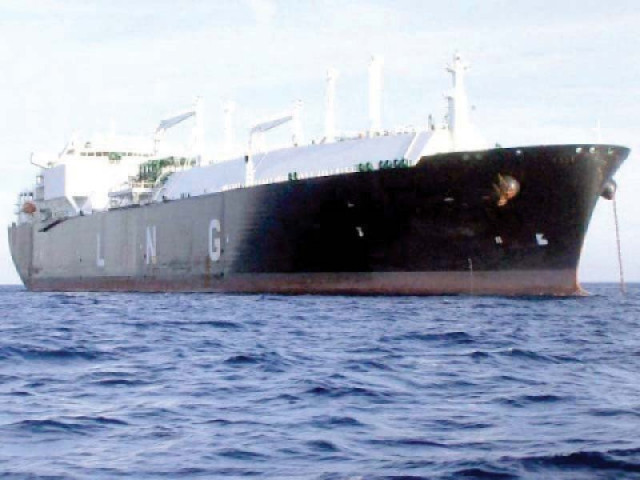Pakistan books pricey LNG cargoes
Shipment for October is 65% more expensive than furnace oil available in the country

Pakistan is set to import two cargoes of liquefied natural gas (LNG) for October at a price, which is almost 65% more expensive compared to furnace oil available in the country, unnecessarily adding to the soaring import bill and inflation.
Pakistan LNG has purchased two cargoes of LNG at an average price of slightly over $20 per million Btu (British thermal unit) from spot market. “The equivalent amount (heat content) of furnace oil can be bought for around $12 equivalent to one mmbtu LNG,” Pak-Kuwait Investment Company (PKIC) Head of Research Samiullah Tariq said while talking to The Express Tribune.
International energy experts taking to their Twitter accounts said developing countries in Asia are now paying more than $20 per mBtu for LNG spot cargoes. Simply, LNG is becoming unaffordable for poorer nation. “There is another way to look at it: LNG is trading at an oil equivalent of $115 a barrel,” Bloomberg News Chief Energy Correspondent Javier Blas said on his Twitter handle.
To be noted, the international benchmark crude Brent was available at $72.61 per barrel at world markets.
“There is no economic sense to buy LNG at $20 & above. At this price LNG is equivalent to $115/bbl. Time to switch to furnace oil till LNG behaves well. Don’t get blackmail(ed) from cartel,” Economist Muzammil Aslam said on his Twitter handle.
Oil refineries in Pakistan sell furnace oil at a price slightly lower compared to the price of imported crude, a high official at a leading local refinery told the other day.
Refineries in the country were selling furnace oil at an average price of Rs85,000 per ton (or $12 equivalent to one mBtu of LNG). This was an ex-refinery price, meaning the price was excluding some of the taxes, it was learnt.
The import price of LNG at $20 per million Btu also excluded a number of cost heads and taxes.
Pakistan mostly buys LNG to operate gas-fired power houses. Earlier, it switched to the gas-based power plants after setting up the first LNG import terminal in the country in 2015.
Pakistan bought some of the cargos at around $15 per million Btu from spot market recently.
Earlier in December 2020 and January 2021, Pakistan bought 12-13 LNG cargoes each month for an average price of $6.34 per million Btu. The cargos were mix from spot markets and the ones imported under long-term contract with Qatargas.
The LNG spot price has maintained uptrend on spike in demand for quite long in Asia. “The emerging situation demands us to use furnace oil instead LNG where possible,” Tariq said.
To recall, oil refineries were operating at less than half of their installed capacity since the government had abruptly pulled the plug of furnace oil-based power plants and shifted the power production to recently established LNG-based power plants.
The furnace oil was occupying most of the storage capacity at refineries due to loss of bulk buyers which were power producers. The situation prompted refineries to compromise production of co-products like petrol and diesel, increasing import of the refined products in demand ie petrol and diesel to meet local demand.
The authorities concerned have already allowed producing power using furnace oil. “Refineries have sold 510,000 ton of furnace oil in the previous month of August compared to 310,000 tons in the same month last year,” Tariq said.
The refineries sold higher amount of furnace oil in the month compared to their installed capacity, as they had accumulated inventory from previous months. The power production numbers also reflect the same; increased use of furnace oil, he added.
“Pakistan is buying some 60% of the total imported LNG at around $10 per million Btu (or 12-13% of Brent price) these days under the long-term contracts,” Tariq said, adding the blending of the LNG at two different price (under long-term contracts and from spot markets) should lessen the average import price around $14 per million Btu in the country.
“Replacing LNG from sport market with furnace oil would not only reduce the country’s import bill, but the strategy would also save consumers from facing unnecessary increase in inflation,” he said.
Pakistan made record high import payment at $6.3 billion in August. This widened the trade deficit to a record high at over $4 billion in the month and caused local currency depreciating to 13-month low at Rs167 against US dollar on Friday.
Switching to furnace oil, however, led the government to partially pay the fixed capacity cost to LNG import terminals which stand at $272,000 per day for the first terminal. Similarly, it has to pay fix cost to some of power produces, as the country owns surplus power production capacity at present.
Published in The Express Tribune, September 5th, 2021.
Like Business on Facebook, follow @TribuneBiz on Twitter to stay informed and join in the conversation.



















COMMENTS
Comments are moderated and generally will be posted if they are on-topic and not abusive.
For more information, please see our Comments FAQ